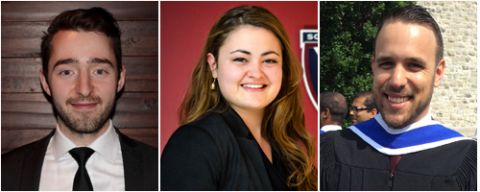
For students, it’s a coveted opportunity to experience life in Canada’s highest court, and two students and an alumnus will be clerking at the Supreme Court of Canada (SCC) in its 2017–2018 session. Jeremy Butt, Law’16, will be clerk to Justice Michael Moldaver, while his peers from the from civil law/common law joint degree program, Alexandra Hebert, Law’16, and Francis Lévesque, Law’15, will both be with Justice Russell Brown.
At the SCC, teams of three clerks work with their judge to help the Court reach just outcomes in nationally important cases. “Clerks generally assist their justice in preparing for hearings and conducting legal research,” says Hebert. Lévesque, who has spent the past year clerking at the Federal Court of Appeal, says, “It’s an enriching experience where you have the opportunity of closely collaborating with the best jurists in the country at the very beginning of your career.”
Each of the three Queen’s Law community members is aiming to have a positive impact on the way the Court develops the law in Canada. “What distinguishes Supreme Court clerkships,” says Lévesque, “is that the Court hears a limited number of cases that generally have great importance for the country.” Butt is keen to take on this role. “I’m looking forward to helping provide practical solutions to intellectually fascinating and complex legal and social policy questions with which the Supreme Court is tasked with solving.”
Hebert is anticipating the Court’s famously collegial atmosphere. “Clerks have the unique privilege of working on complex legal issues of national significance in a stimulating environment. I am very enthusiastic about working with Justice Brown, collaborating with the other clerks and engaging in intellectually challenging discussions.”
Butt credits the Queen’s Law community for all its help and support for making his “amazing opportunity” possible. “It has equipped me with the tools which are essential for success in a clerkship role. Throughout my time at Queen’s I have improved my substantive knowledge of the law and ability to research and write.
“My time at Queen’s Law has taught me how to think about a legal issue: to critically assess it in order to tackle a problem and ultimately come up with a workable solution.”